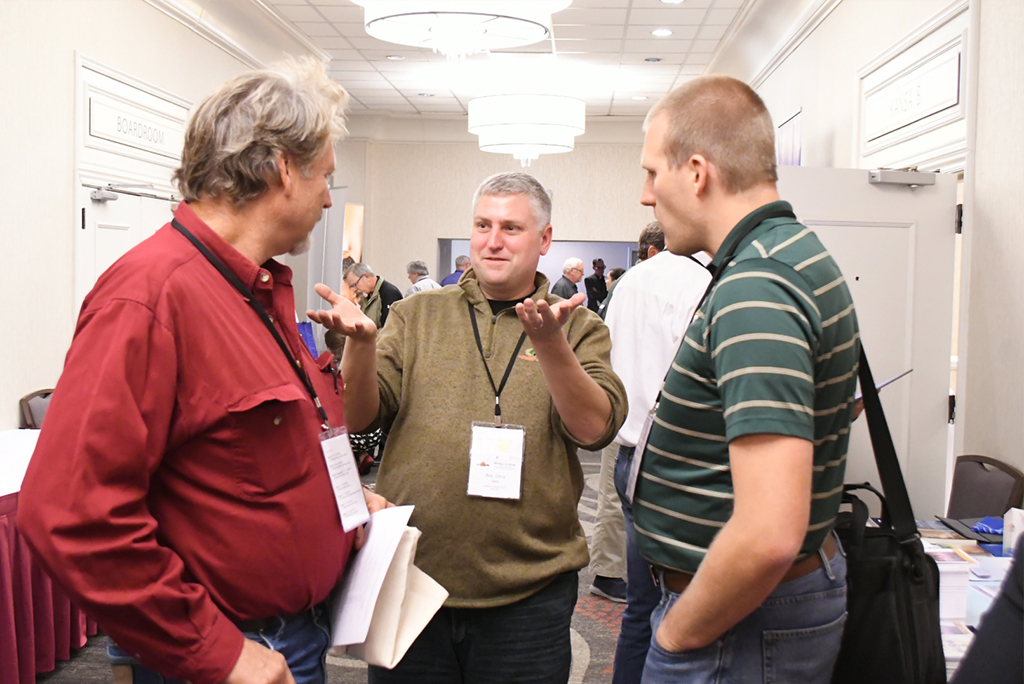
By Cheryl Magness
“Don’t tell them what Lutherans do; tell them who Jesus is.”
These words from the Rev. Dr. Gregory Seltz began the 2017 LCMS Rural and Small Town Mission (RSTM) conference, held Nov. 9–11 in Kansas City, Mo., under the theme “Standing on Our Heritage: It’s Still All About Jesus.”
Seltz, executive director of the Lutheran Center for Religious Liberty, led daily Bible study at the conference, focusing on how Jesus is the same yesterday, today and forever (Heb. 13:8).
The past/present/future division provided an overarching structure to the three-day conference, as attendees were invited to consider, in turn, the past, present and future of rural and small-town ministry.
A recurring topic, in both plenaries and breakout sessions, was the impact of demographic trends on Christianity in general and rural and small-town ministry in particular.
‘Rewriting the rural narrative’
Benjamin Winchester, senior research fellow at the University of Minnesota Extension Office, and Randolph L. Cantrell, rural sociologist with Rural Futures Institute at the University of Nebraska, presented a two-part plenary on “Rewriting the Rural Narrative.”
Winchester challenged the prevailing view that the “brain drain” is killing small towns as high school graduates move away, never to return, and painted a more hopeful picture, detailing a “migration in” to small towns that is occurring among 30-, 40- and 50-year-olds.
According to Winchester, the rural population of the United States has risen 11 percent since 1970 (statistics that show it declining are reporting it relative to the urban population, which has risen even faster).
Cantrell talked about the challenges RSTM churches face in reaching out to the community, noting that there are things they can learn about evangelism from those who work with immigrant populations. He said it can be more difficult to evangelize to those who are “like us” because they are sometimes harder to see in our midst, but that the Church remains the most significant manifestation of what sociologists call “third places” — locations apart from home and work that help to build community.
The Rev. Mike Boothby, sole pastor at St. Paul’s Lutheran Church, Ireton, Iowa, found the discussion of demographics to be “very valuable,” noting that the rural and small-town pastor “may not always have another church worker nearby to discuss how to best address the needs of his congregation.”
This was the third RSTM conference for Boothby, who said that the “most uplifting” aspect of the conference was being with those in a situation similar to his own: “I love serving my congregation and living in my town, and it’s so wonderful to meet people who feel the same way about their calls and communities. Everybody at the conference is here because they love the churches they serve and the communities in which they live.”
Tools for sharing the Gospel
Other conference plenaries were provided by the Rev. Todd Kollbaum, LCMS RSTM director; the Rev. Dr. Heath Trampe, pastor of Faith Lutheran Church, York, Neb.; and the Rev. Benjamin Meyer, pastor of Hope Lutheran Church, Sunbury, Ohio. Breakout sessions covered a variety of topics, including strategic planning, teaching the faith to youth/college students/adults, confirmation, Sunday school, equipping lay leaders, ministry to inactives, using technology in ministry, stewardship, the healthy congregation, vacation Bible school and partnering with other congregations.
The Rev. Robert Moeller Jr., a tri-parish pastor in Minnesota, brought lay leaders from all three of his parishes — Our Savior’s in Pipestone, Minn.; St. John’s in Trosky, Minn.; and Trinity in Jasper, Minn. — with funding from a grant provided by the LCMS Minnesota South District. Each set of leaders plans to take something learned at the conference back to the parish to implement and later report on to the district.
Said Moeller: “We came to the conference hoping to find a few tools that we could use to help us to improve our efforts in sharing the Gospel in our community. We were not disappointed. … So many of the sessions dealt with areas of ministry in which we want to improve, and now we know we don’t have to build them from scratch. I especially appreciated the emphasis on relationships and focusing on the positive aspects of rural and small-town living.”
Gary and Carmen Hailey, members of Moeller’s congregation in Pipestone, were “surprised” to find out “how important participation in Bible study is as an indicator of a healthy congregation.”
Richard and Patricia Rieck, also of Pipestone, said they couldn’t wait “to get home to start using what we have learned.”
There were many repeat attenders at the conference. This year was the fourth time for the Rev. Kevin Ader, pastor at St. John Lutheran, Wisconsin Rapids, Wis. Ader says he keeps coming back because of the “useful and practical resources” that are “applicable to our needs and situation.”
First-time attendee Janet Goll, a member of the evangelism committee at First Lutheran, Ponca City, Okla., said she came seeking ideas for outreach. She was inspired by a breakout session on the quilting ministry at Trinity Lutheran Church, Algona, Iowa: “I was amazed at the growth of that ministry and how they just pretty much stepped out in faith and the Lord provided.”
Almost 150 participants from 23 states and Canada attended the conference. In addition to the LCMS, there were participants from the Evangelical Lutheran Synod, the American Association of Lutheran Churches, and Lutheran Church—Canada.
The theme of the next RSTM conference, scheduled for Nov. 8–10, 2018, is “Have No Fear” (Matt. 19:26).
For more information about LCMS Rural and Small Town Mission, go to lcms.org/rstm or facebook.com/LCMSRSTM.
Cheryl Magness (cheryl.magness@lcms.org) is managing editor of Reporter Online and staff writer for LCMS Communications.
Posted Nov. 29, 2017




